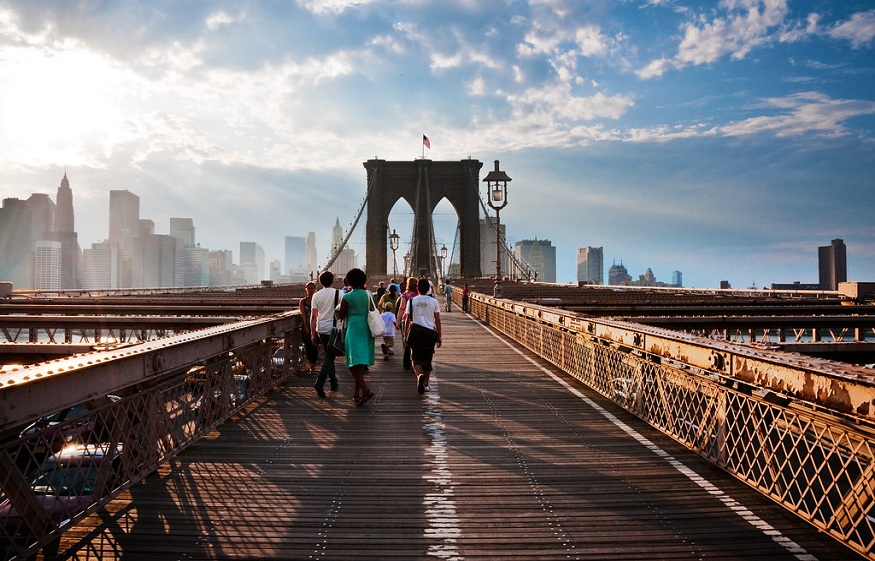weird and exciting facts about the Brooklyn Bridge

The Brooklyn Bridge is not only one of the many marvels of 19th century engineering – as well as a must-visit/must-photograph site when visiting New York – but it is also part of our series of fun historical facts to impress, delight and win every quiz.
14 years of work and 600 workers
After 14 years of work that cost a whopping $15 million, the Brooklyn Bridge, opened in 1883, finally made it possible to connect Manhattan and Brooklyn. It took more than 600 workers to transform some 6,740 tons of material into this emblematic marvel of the industrial revolution. The bridge is supported by four cables each measuring 3,578 feet (1,090 m) long, 15.5 inches (40 cm) thick, and made up of 21,000 individual wires.
First of its kind
The Brooklyn Bridge was the first steel-wire suspension bridge, and at the time of its construction its main span of 1,595 feet (486 m) made it the longest suspension bridge in the world.
Littered with tragedies
The construction of the Brooklyn Bridge took a heavy (human) toll – there are no exact figures, but at least 20 people lost their lives during the construction of this architectural masterpiece. Starting with the designer, John A. Roebling, whose crushed foot earned him a toe amputation, before finally dying of tetanus shortly afterwards. Many workers fell from the top of the bridge, were struck by debris, or contracted decompression sickness or “caisson sickness” which paralyzed workers, including Washington Roebling, son of the bridge’s creator.
Emily saved the day
Washington, who had taken over after his father’s death and was bedridden due to illness, had to carry out the construction without being physically present. All of this was made possible by his energetic wife, Emily Warren Roebling , who eventually became the ideal assistant chief engineer by taking over just about every activity Washington couldn’t handle during the last 11 years of construction. from the bridge. It was because Emily had played a crucial role in the construction of the Brooklyn Bridge that she was the first person to cross it on inauguration day.
The name game lasted, lasted, lasted…
The bridge was first named “New York and Brooklyn Bridge”, then became “East River Bridge”, before being officially renamed “Brooklyn Bridge”, in 1915.
Another Tragedy
Even after the bridge was opened, the tragic deaths did not cease. On Memorial Day, 1883, a woman caught her heel in the boards of the pedestrian walkway – as she began to scream, those around her thought the bridge was about to collapse. A panic ensued and 12 people were trampled to death on the stairs, while many others were injured.
21 elephants to the rescue
The stampede incident made people suspicious, and there was only one solution left to assure the public that the Brooklyn Bridge would not collapse: In 1884, Jumbo, a seven-ton elephant, accompanied by 20 of his fellows, left the big top of his circus for a relaxed stroll between Brooklyn and Manhattan. The parade on the Brooklyn Bridge was literally a walk in the park – the spectators were delighted, the elephants made history and the circus pulled off the publicity stunt of its life.
100,000 vehicles and 4,000 pedestrians
The Brooklyn Bridge is a busy place – over 100,000 vehicles cross it every day. Since the bridge is one of many of New York’s most photographed sites, let’s add 4,000 pedestrians and nearly 2,600 bicycles to the daily traffic volume.







